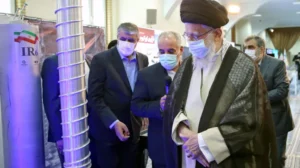

Iran Warns of Nuclear Doctrine Change if Existence Threatened: Latest Statements and Analysis
Iran has issued a stark warning that it may alter its nuclear doctrine and potentially develop nuclear weapons if its existence is threatened, particularly by Israel. Here’s a detailed analysis of the latest statements and their implications.
Threats and Statements
- Kamal Kharrazi’s Warning:
- Kamal Kharrazi, a senior advisor to Supreme Leader Ayatollah Ali Khamenei, stated that if Israel threatens Iran’s nuclear facilities or its existence, Iran’s level of deterrence will change. He emphasized that while Iran has so far refrained from developing nuclear weapons, it would be forced to reconsider its nuclear doctrine if its existence is threatened.
- Ahmad Haghtalab’s Comments:
- Ahmad Haghtalab, a senior IRGC commander, also warned that if Israel continues to threaten Iran’s nuclear sites, Tehran could revise its nuclear doctrine and policies, deviating from past declarations.
- Ali-Akbar Salehi’s Remarks:
- Ali-Akbar Salehi, a key foreign policy voice in the Iranian government, mentioned that Iran has the capability to produce a nuclear bomb but has not taken the step of making one. However, he hinted that if Iran’s existence is threatened, it would have to change its nuclear doctrine.
Context and Implications
- Escalating Tensions with Israel:
- The warnings come amidst escalating tensions between Iran and Israel, including recent attacks and retaliations. On April 13, Iran launched over 300 drones and missiles at Israel in response to an Israeli strike on its consulate in Damascus.
- Nuclear Enrichment Levels:
- Iran has been enriching uranium to 60% purity, which is close to the 90% needed for weapons-grade uranium. This has raised concerns about its nuclear ambitions, despite Tehran’s insistence that its program is for civilian purposes.
- International Reactions:
- The International Atomic Energy Agency (IAEA) has expressed concerns over Iran’s nuclear activities, with Director-General Rafael Grossi warning that Iran is only weeks away from having enough enriched uranium to produce a nuclear bomb.
- Potential Withdrawal from NPT:
- There are also hints that Iran might withdraw from the Nuclear Non-Proliferation Treaty (NPT) if it feels threatened, which would remove a significant legal barrier to developing nuclear weapons.
Historical Context and Nuclear Doctrine
- Fatwa Against Nuclear Weapons:
- Supreme Leader Ayatollah Ali Khamenei issued a fatwa in the early 2000s forbidding the development of nuclear weapons in Islam. However, recent statements suggest that this stance could change if Iran’s existence is threatened.
- Shift in Rhetoric:
- The rhetoric has shifted in recent years, with Iranian officials increasingly mentioning the possibility of developing nuclear weapons as a deterrent. This marks a significant change from the previous stance of strictly adhering to a peaceful nuclear program.
Conclusion
The latest statements from Iranian officials indicate a significant shift in Iran’s nuclear doctrine, suggesting that the country may reconsider its stance on developing nuclear weapons if its existence is threatened. This escalation in rhetoric and capability highlights the growing tensions between Iran and Israel and the broader international community’s concerns over Iran’s nuclear ambitions.This article provides a detailed analysis of the latest statements and their implications, making it a valuable resource for those interested in the evolving dynamics of Iran’s nuclear program.
Discover more from
Subscribe to get the latest posts sent to your email.







